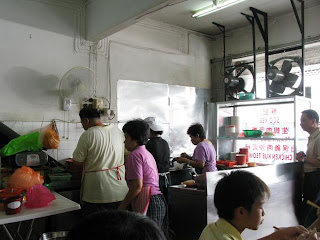










Lately, my tastebuds have seemed to haven taken a new and profound delight in one of Malaysia's prized dishes: Ipoh hor fun and prawn wonton soup. No doubt, the best Ipoh hor soup still originates from Ipoh but KL does offer a few good eating outlets like Soo Kee and TK Chong coffeshop that serve good imitations of the fragrant and wonderful bowl of soup noodles. What is not comforting about a piping bowl of rich and fragrant stock that has boiled for endless hours using poached tender chicken and prawns on a cold, drizzly aftenoon? Furthermore the savoury broth with a hint of prawn oil is immersed in silky smooth rice noodles, lusciously tender chicken pieces and juicy, fresh prawn wontons. You definitely cannot find a single flaw in this nourishing bowl of soup that is easily digestible and soothing for the stomach making it an ideal choice for children and elderly.
I think what strikes me more about this bowl of soup is the fact that I have grown up loving and accquiring the taste since the tender age of 6 years. I am flooded with an array of childhood memories and I recall the trips I took with my parents on a Sunday afternoon after 1 1/2 hours of Malay tuition (till this day I have yet to master that language) to the famous Soo Kee restaurant which has been awarded as the best Ipoh hor fun in the Klang Valley by the Foodster awards and gorging myself on a bowl of Ipoh hor fun with prawn wontons. I enjoyed slurping up the delicious soup and sometimes grabbing a forkful of steamed chicken pieces drizzled in oyster sauce which is another one of the shop's specialities. I recall the shop's owner barking orders at the workers and frantically attending to the bustling queue of long waiting customers as well as the lady in the corner (probably the owner's wife) who was carefully wrapping each prawn wonton with the right amount of minced meat each with a single, glazed prawn. Or the man in the front counter expertly chopping the chicken pieces on his cutting board and drizzling it with splash of a dark oyster sauce before hollering instructions on who it should be served to. Since the portion they serve is rather small, my parents and I would sometimes hop over the Chinese store next door to buy some good old assorted Chinese snacks such as sak ke mah, chicken and pork floss, dried barbeque meat slices, peanut cookies, rice crispies candies coated in creamy caramel or stack up on bak kut teh or herbal chicken packet soups. Sadly, that shop is no longer available as some food bloggers have pointed that the owner has retired. I've still yet to try Soo Kee's famous Ipoh hor fun prawn wonton soup since returning from Sydney and kind of looking forward for an opportunity to do so.
Another big rival of the Ipoh hor fun business is TK Chong coffeeshop which boasts legendary steamed chicken, 'shiok' ipoh hor fun soup and delectable prawn wontons. My breath was literally taken away when I first had a taste although I was wondering whether they added MSG to enrich the sweet and flavoursome soup and I later found out that a food blogger who is intolerant of MSG dubiously agreed that they do indeed add MSG to their soup. How disappointing...but I doubt this small mishap will prevent me from future visits to the shop. I can assure you that that I will be still be enjoying my Ipoh hor fun/prawn wonton soup when I am 80 years old as its not only a scrumptious bowl enriched with nutrients but with a subtle hint of childhood memories.








